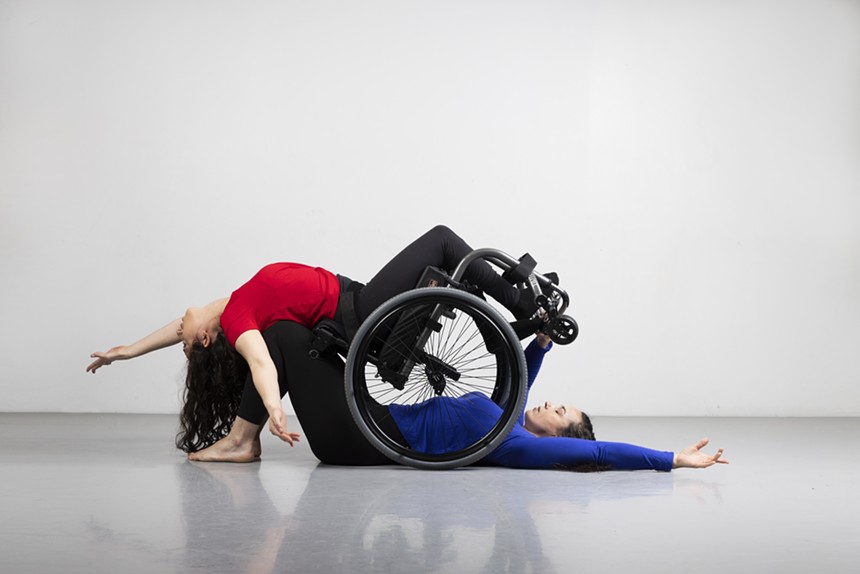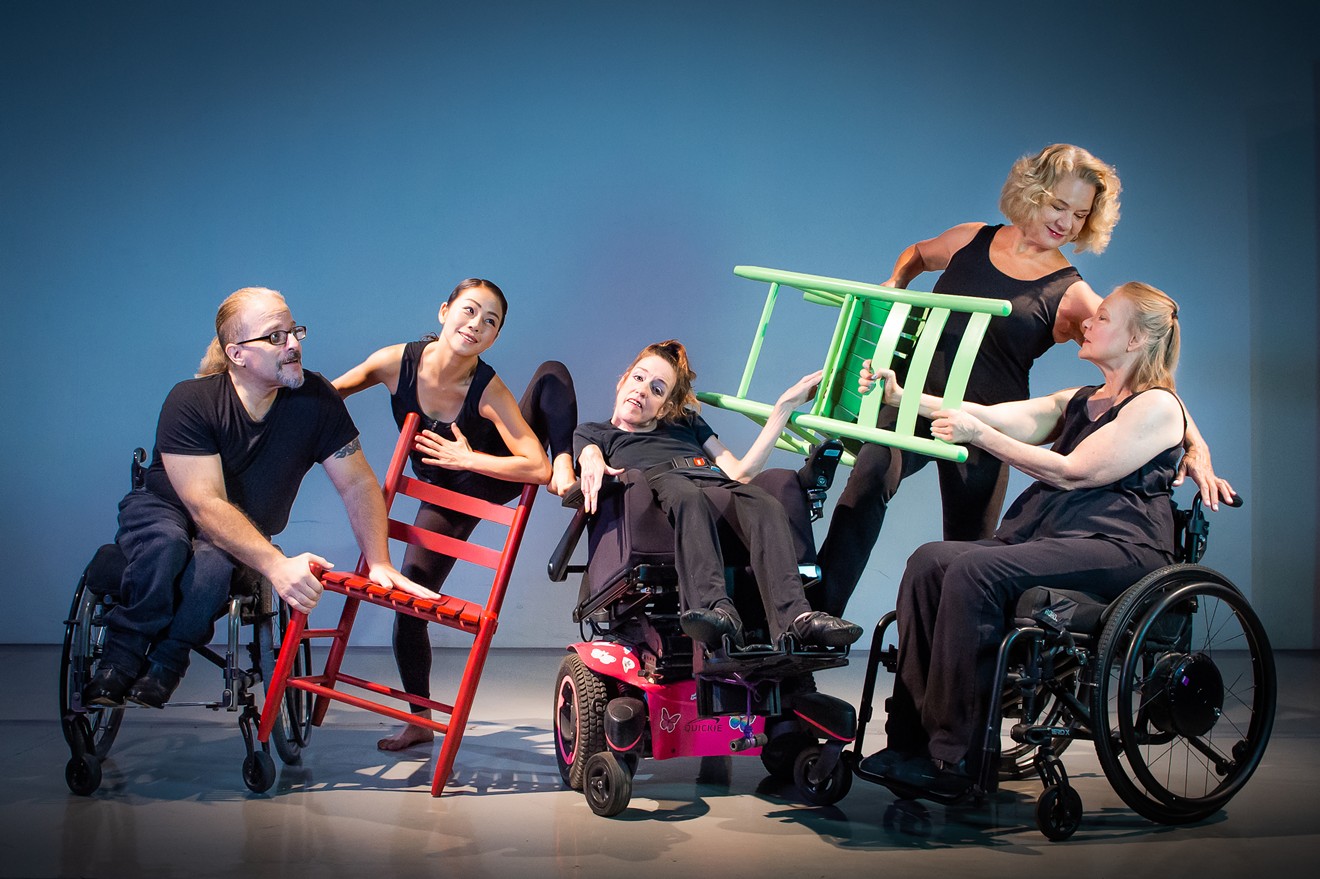The fourth annual Forward Motion Physically Integrated Dance Festival and Conference — a series of performances, workshops, and round-table discussions running from October 27-29 — implores audiences to think critically about who they've been taught are allowed to perform on stages and how an ableist lens has informed those ideas.
Karen Peterson, the Miami-based artistic director of Karen Peterson and Dancers, has produced Forward Motion annually since its inception in 2018. She says the festival's celebration of physically integrative dance, a form that rose to prominence in the 1990s with aims of increasing visibility for dancers with disabilities, is not about tokenizing dancers with disabilities. Rather, its goal is to create collaborative, visual experiences in which dancers, both with and without disabilities, hold equal focus and importance.
"I would like Miami dance audiences to challenge their biases about who can or should be a performer and open their minds about the possibilities of having a unique visual experience based on choreographic concepts, music, and movement — not on their prejudices," Peterson says.
This year's festival includes Florida premieres of works from Georgia's Full Radius Dance, as well as Karen Peterson and Dancers' performance of a new piece from LA-based choreographer Victoria Marks, a Guggenheim and Rauschenberg fellow and Alpert Award winner.
After two evenings of performances at the Miami-Dade County Auditorium on October 27 and 28 at 7:30 p.m., audiences are invited to a day of workshops and discussions at the Miami Dade College Koubek Memorial Center on October 29. The Forward Motion conference begins at 10 a.m. with a studio workshop open to movers of all abilities led by Douglas Scott, artistic and executive director of Full Radius Dance, the Atlanta-based dance company he founded in 1990.
Scott says his experiences teaching dance classes for those both with and without disabilities have broadened how he defines who is a dancer.
"One of our statements of purpose at Full Radius Dance is: 'Your body is perfect. Your body has undiscovered movement. Your body can experience dance.' I became dedicated to reshaping the way we talk about dance in the modern world. My company deconstructs widely held standards in Western dance and places accessibility at the center of its mission," he says.
Full Radius Dance will perform a pair of pieces for Forward Motion audiences: Undercurrents uses flowing arm movements to explore how new energy can lead existing relationships in unexpected directions, while a series of excerpts from the upcoming full-length production Alice, Peter, and Dorothy examines fantasy works like Alice in Wonderland, Peter Pan, and The Wizard of Oz through a disability-centric lens.
"It has been strongly suggested that the Tin Man of Oz was a character influenced by Civil War amputees, and Peter Pan's Captain Hook is an amputee with a prosthesis. Many fantastical creatures who are found within the novels — mermaids, the Mad Hatter, and the residents of the Dainty China Country, for example — are representations of the 'other' who are living in a position of irreconcilable otherness and are accepted in their fantasy world. In reality, however, they would be socially ostracized and viewed as perpetually incapable of belonging," Scott says. "The parallel to the lived experience of disability is striking."

Atlanta-based Full Radius Dance Company members Sonya Rio-Glick and Ashlee Jo Ramsey-Borunov perform Duet with Chair.
Photo by Bubba Carr
"I wanted to consider how moving in a wheelchair is an asset in the world. Static dining room chairs are a challenge when it comes to turning and rolling," Marks says. "I'm interested in the puzzle of making a dance that shifts the way we think about who we are together."
During the Forward Motion conference, Marks will lead a workshop on choreo-portraiture and participate in a round-table discussion around ideas like, "Can dances be a force for social change? Can a dance change how we think about bodies and lives well-lived?" Marks has been choreographing for stage and film for four decades, and much of her work in recent years has challenged paradigms around ability and questioned how that translates to value on a societal scale. A UCLA professor of dance who serves as chair of UCLA's disability studies minor, Marks leads the UCLA Dancing Disability Clinic, a gathering place for dance artists with disabilities to share ideas, build dance practices, and form a community.
"Over the last number of years, I've been organizing my thoughts in terms of whose ideas of value are at work. Let's face it — we live in a tremendously ableist world. Ableism and white supremacy are in a very tight partnership," Marks says. "These ideas of what has value and what is beautiful are most often affirmations of ableist aesthetics. What, then, would be a new system of values we might encounter with an eye toward disability aesthetics? How can we reimagine beauty, the holiness of the body, the precious, cherished moments of life, and its complexity?"
Marks says the Forward Motion Festival provides an opportunity for just that sort of reckoning among all who participate.
"This festival isn't just about giving people with disabilities the chance to dance and be on a stage. This is about changing the way people see," she says. "Learning from artists with disabilities is an opportunity for everybody to recalibrate the ways in which we live in a regime of 'normal,' which is a myth."
Scott's Full Radius Dance is the only physically integrated dance company in Georgia, so attending Forward Motion in Miami provides a welcome opportunity to contribute toward the creation and strengthening of a community of like-minded individuals.
"We, meaning physically integrated dance companies, rarely get the chance to meet in shared performances. With this comes exchanges of ideas and opportunities for supportive talk and action and for nurturing our artistic souls," Scott says.
He hopes each audience member leaves the festival and conference with a sense of discovery and surprise after having experienced the true depth and beauty of dance and the human form.
"As Agnes DeMille said, 'The truest expression of a people is in its dances and its music. Bodies never lie,'" Scott says. "Physically integrated dance is predicated on an understanding of disability as a part of human diversity, not something to be fixed or cured."
Peterson says audience members are surveyed after each annual Forward Motion festival and conference. Though she finds many responses a promising indication of positive change, there is still much work to be done to erase centuries of ableism from our conceptions of art forms like dance.
"Many say they were moved, that they never knew this dance form existed and they would come back again," Peterson says. "The audience community is growing, but there are still many individuals who are skeptical when they think about disability, ability, and dance. Time for Miami to think outside the box."
The Forward Motion Physically Integrated Dance Festival and Conference. 7:30 p.m. Thursday, October 27, and Friday, October 28, at Miami-Dade County Auditorium, 2901 W. Flagler St., Miami; and 10 a.m. to 6 p.m. Sunday, October 29, at Miami Dade College Koubek Memorial Center, 2705 SW Third St., Miami; karenpetersonanddancers.org. Tickets cost $10 to $25.












